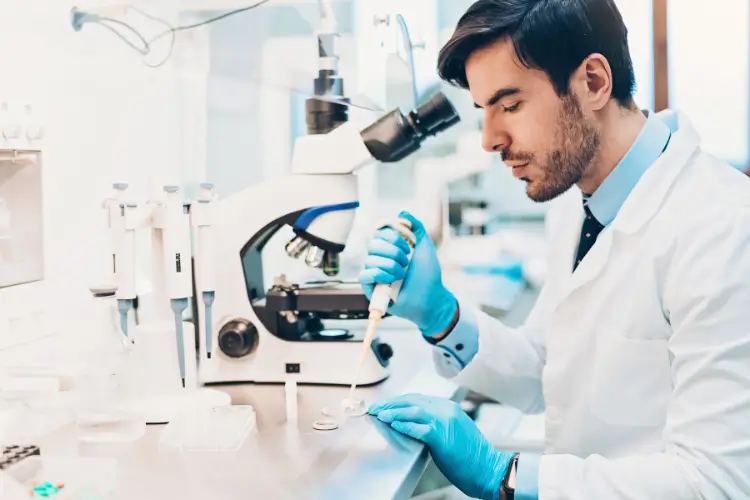Feeling constantly low, anxious, or emotionally drained isn’t always just about stress or life events—your hormones might be playing a bigger role than you realize. These tiny chemical messengers affect everything from your sleep and energy to your mood and mental clarity.
When they’re out of balance, they can quietly set the stage for serious mental health challenges, including major depressive disorder. The good news? Treating the hormonal root causes can make a huge difference.
In this blog, we’ll explore six common hormone-related health conditions that may lead to depression, and why understanding them is key to finding the right treatment.
1. Insulin Resistance and Metabolic Dysfunction: The Hidden Depression Trigger
Insulin resistance represents one of the most overlooked connections between physical and mental health. This metabolic condition affects far more than just blood sugar levels—it can fundamentally alter brain chemistry and mood regulation.
Cutting-Edge Treatment Protocols
GLP-1 agonists, originally developed for diabetes, show promise for treating hormone imbalance depression by improving insulin sensitivity and reducing inflammation. Ketogenic dietary therapy helps stabilize blood sugar and increase brain-derived neurotrophic factors that support mood regulation.
Time-restricted eating protocols restore metabolic rhythm, while metformin is increasingly used as an adjunct to Major Depressive Disorder treatment when metabolic dysfunction is present.
The evidence linking metabolic health to depression continues to grow, suggesting that addressing insulin resistance may be a fundamental component of treating certain types of depressive disorders.
The Insulin-Mood Connection Explained
Insulin resistance disrupts the body’s ability to produce and utilize key neurotransmitters responsible for mood regulation. When cells become resistant to insulin, the resulting blood sugar fluctuations create hormonal effects on mood that can manifest as irritability, anxiety, and depression.
Recent studies in metabolic psychiatry have revealed that insulin’s influence extends beyond energy metabolism to directly impact brain function and neuroplasticity, creating a strong link between metabolic health and depression.
Advanced Diagnostic Approaches
Doctors now use continuous glucose monitoring to track blood sugar patterns to mood changes, revealing connections that standard testing might miss. The Homeostatic Model Assessment of Insulin Resistance (HOMA-IR) test has shown significant correlation with depression severity in multiple studies.
Beyond standard bloodwork, clinicians are now measuring metabolic biomarkers like inflammatory cytokines and oxidative stress markers to better understand the insulin-brain connection.
2. Cortisol Dysregulation and HPA Axis Dysfunction: Beyond Basic Stress Management
When stress becomes chronic, it disrupts our body’s primary stress-response system, creating hormonal imbalances that directly impact brain function and mood. This complex relationship goes far beyond feeling “stressed out.”
Understanding Cortisol’s Complex Role in Depression
Diurnal cortisol patterns often become flattened or irregular in people with depression, losing the natural morning peak that helps energize the body. Abnormalities in cortisol awakening response, the natural surge that occurs 30-45 minutes after waking, strongly correlate with depression severity. Cortisol dysregulation often connects to other hormone-related health conditions, creating a cascade effect that worsens mood disorders through multiple pathways.
Revolutionary Assessment Methods
Four-point salivary cortisol testing throughout the day provides a more accurate picture of HPA axis function than single blood draws. Hair cortisol analysis offers a retrospective view of cortisol levels over months, helping identify chronic stress patterns that blood tests miss.
Wearable technology now allows for real-time monitoring of stress biomarkers, enabling more precise treatment targeting based on individual patterns.
Innovative Treatment Strategies
Adaptogenic herbs like ashwagandha and rhodiola can be tailored to individual cortisol patterns, helping restore proper HPA axis function. For convenience, an ashwagandha supplement Amazon can provide an easy way to incorporate this herb into your daily routine. Phosphatidylserine supplementation, when timed correctly, helps regulate excessive cortisol production. Vagal tone optimization through breathwork, humming, and specialized exercises helps reset stress responses.
Circadian rhythm reset protocols address the bidirectional relationship between sleep, cortisol, and depression. Understanding the detailed patterns of cortisol dysregulation opens the door to more targeted interventions for depression related to chronic stress.
3. Thyroid Dysfunction: The Metabolic Mood Regulator
Thyroid hormones regulate virtually every cell in the body, including brain cells responsible for mood regulation. When thyroid function becomes disrupted, depression often follows, requiring a more nuanced approach than standard thyroid testing provides.
Beyond TSH: Comprehensive Thyroid Assessment
Reverse T3, a metabolically inactive form of thyroid hormone, can accumulate during stress or illness, blocking receptors and causing depression even when standard TSH tests appear normal. Thyroid antibodies indicate autoimmune conditions that may cause fluctuating hormone levels and mood instability before affecting standard test results.
Wilson’s Temperature Syndrome, characterized by low body temperature and symptoms of hypothyroidism despite normal lab values, frequently correlates with treatment-resistant depression.
Advanced Diagnostic Protocols
The ratio of Free T3 to reverse T3 provides critical information about cellular thyroid availability that standard tests miss. Testing for thyroid peroxidase and thyroglobulin antibodies helps identify autoimmune thyroid issues that may cause mood disorders years before affecting TSH.
Selenium and iodine status testing reveals nutritional factors that may impair thyroid hormone conversion and contribute to depression symptoms.
Next-Generation Treatment Approaches
T3-only therapy can rapidly improve depression symptoms in some patients who don’t respond to standard T4 treatment. Combination T4/T3 protocols more closely mimic natural thyroid function and often produce better mood outcomes than T4 alone.
Optimizing thyroid hormone levels within the upper percentiles of normal ranges supports neuroplasticity and depression recovery. Targeted nutrient therapy with selenium, zinc, and iodine supports thyroid function at a cellular level.
The thyroid-mood connection represents one of the most treatable forms of depression when properly identified and addressed with comprehensive testing and personalized protocols.
4. Sex Hormone Imbalances: Personalized Approaches to Hormonal Effects on Mood
Personalized Approaches to Hormonal Effects on Mood Sex hormones do far more than regulate reproductive function—they profoundly influence brain chemistry, neuroinflammation, and mood regulation through multiple pathways. Understanding these complex interactions allows for targeted interventions for hormone imbalance depression. Individuals typically prefer treatments like hormone replacement therapy greenville (or elsewhere) that are tailored to their specific hormonal profile, aiming to restore balance, alleviate mood-related symptoms, and improve overall well-being.
Estrogen Dominance and Mood Disorders
Genetic variants in the COMT gene affect estrogen metabolism, potentially causing mood disorders when estrogen builds up or breaks down into harmful metabolites. Environmental xenoestrogen exposure from plastics, pesticides, and personal care products can disrupt natural hormone balance and trigger depression. Optimizing the estrogen-to-progesterone ratio often proves more important for mood stability than absolute hormone levels.
Testosterone Deficiency in Both Genders
Free testosterone levels often prove more relevant to mood than total testosterone, as only unbound hormones can enter brain tissue. Sex hormone binding globulin (SHBG) rises with age, stress, and inflammation, reducing bioavailable testosterone even when total levels appear adequate.
Properly administered testosterone therapy protocols can significantly improve depression symptoms in both men and women with documented deficiencies.
Precision Medicine Approaches
Genetic testing for hormone metabolism pathways helps identify individuals at higher risk for hormone-related depression. Bioidentical hormone replacement timing and dosing based on individual metabolism patterns produce better outcomes than standardized approaches.
Micronutrient cofactor assessment ensures the body has the tools needed to properly metabolize hormones. Detoxification pathway optimization supports healthy hormone clearance and recycling. Achieving this precision can require medications personalised for the individual. This is where a specialised compounding pharmacy sydney, or elsewhere, can prepare custom formulations precisely as prescribed by a healthcare professional. This can help minimize side effects and maximize therapeutic benefits.
The complex interplay between sex hormones and mood requires a sophisticated approach that considers individual genetic, environmental, and lifestyle factors.
5. Gut-Brain-Hormone Axis Disruption: The Emerging Connection
The gut microbiome has emerged as a crucial regulator of hormone production and metabolism, with direct impacts on brain function and mood regulation. This three-way communication network represents a frontier in depression treatment.
Microbiome’s Role in Hormone Production
Gut bacteria produce over 90% of the body’s serotonin, making intestinal health crucial for mood regulation. Short-chain fatty acids produced by beneficial gut bacteria modulate hormone signaling and inflammation throughout the body.
Disruption of the estrobolome, gut bacteria that metabolize estrogens, can lead to hormone imbalances and depression through altered estrogen recycling and clearance.
Advanced Assessment Methods
Comprehensive stool analysis with short-chain fatty acid measurement reveals information about the gut’s ability to support neurotransmitter production. Urinary neurotransmitter testing helps identify imbalances in serotonin, dopamine, and other mood-regulating compounds with gut connections.
Intestinal permeability assessment detects “leaky gut” conditions that may trigger inflammation-induced depression. Bile acid metabolism evaluation reveals how effectively the body processes hormones for elimination.
Targeted Intervention Strategies
Psychobiotic supplementation with specific bacterial strains shown to support mood regulation can address both gut and mental health. Prebiotic fibers feed beneficial bacteria that produce mood-enhancing compounds in the intestines.
Digestive enzyme optimization ensures proper breakdown and absorption of nutrients needed for hormone production. Targeted probiotic strains help balance estrogen metabolism and support hormone equilibrium.
The gut-brain-hormone axis offers new treatment avenues for depression that addresses root causes rather than just managing symptoms.
6. Circadian Rhythm Disruption: The Master Clock of Hormonal Health
Our internal timing system coordinates virtually all hormone production and metabolism, making circadian rhythm regulation fundamental to mood stability and mental health. Modern lifestyle factors that disrupt these cycles can trigger depression through multiple hormone pathways.
How Light Exposure Affects Hormone-Related Health Conditions
Melatonin suppression from evening light exposure disrupts sleep architecture and contributes to depression through multiple pathways. Cortisol rhythm disruption from irregular sleep patterns creates mood instability and resistance to standard depression treatments. Growth hormone, released primarily during deep sleep, plays crucial roles in brain repair and mood regulation that become compromised with circadian disruption.
Modern Assessment Techniques
Dim light melatonin onset testing helps identify circadian rhythm abnormalities that standard sleep studies miss. Actigraphy devices track sleep patterns over weeks, revealing subtle disruptions in sleep-wake cycles that affect hormone production.
Light exposure monitoring tools measure timing, intensity, and spectrum of daily light exposure that impacts circadian regulators. Core body temperature rhythm tracking reveals misalignments between internal clocks and external schedules.
Evidence-Based Treatment Protocols
Phototherapy timing based on individual chronotype helps reset circadian rhythms that regulate hormone production. Blue light blocking strategies in the evening protect melatonin production and support healthy sleep architecture.
Dawn simulation therapy creates a gradual morning light transition that helps normalize the cortisol awakening response. Chronotherapy adjusts sleep timing to resynchronize internal clocks and improve major depressive disorder treatment outcomes.
Addressing circadian rhythm disruption represents one of the most accessible yet powerful interventions for hormone-related depression in our modern environment.
Advanced Treatment Integration and Monitoring
Successfully addressing hormone-related depression requires sophisticated integration of multiple treatment approaches tailored to each individual’s unique biochemistry. This personalized medicine approach yields results that exceed what any single intervention can achieve.
Personalized Treatment Protocols
Comprehensive hormone panel interpretation helps identify which specific imbalances are contributing to depression symptoms in each individual. Treatment sequencing and timing based on natural hormone rhythms enhance effectiveness and reduce side effects.
Monitoring biomarkers beyond symptom questionnaires provides objective feedback on treatment response. Adjusting protocols based on individual response patterns ensures continual optimization of hormone-related health conditions.
Technology-Enhanced Care
Wearable devices now enable continuous tracking of hormone-related variables like temperature, heart rate variability, and sleep patterns. AI-powered treatment optimization helps identify patterns and correlations that human analysis might miss.
Telemedicine hormone monitoring allows for more frequent adjustments without increasing patient burden. Digital therapeutics designed specifically for hormone balance can complement medical treatments.
The integration of these advanced approaches creates a powerful framework for addressing the complex relationship between depression and hormones.
Common Questions About Hormone-Related Depression
1. What is the best treatment for hormonal depression?
Treatment for hormonal depression depends on the underlying cause, but may include hormone replacement therapy, antidepressants if hormone therapy isn’t suitable, birth control pills for PMDD, and over-the-counter pain relievers for physical symptoms.
2. What factors contribute to major depressive disorder?
Risk factors include certain personality traits like low self-esteem and pessimism, traumatic or stressful events such as abuse or loss of a loved one, difficult relationships, and financial problems.
3. Is there a link between hormones and depression?
Some mood changes and depressed feelings occur with normal hormonal changes. But hormonal changes alone don’t cause depression. Other biological factors, inherited traits, and personal life circumstances are associated with a higher risk of depression.
Finding Your Path to Hormonal Balance and Mental Wellness
Understanding the complex relationship between hormone-related health conditions and depression opens new doors for effective treatment. By addressing the underlying hormonal imbalances rather than just managing symptoms, many people find lasting relief from depression that previously seemed treatment-resistant.
If you’re struggling with depression that hasn’t responded well to standard treatments, consider exploring these hormonal connections with a knowledgeable healthcare provider. With proper testing and personalized treatment approaches that target your specific hormonal needs, you may discover a path to mental wellness that previously seemed out of reach.




